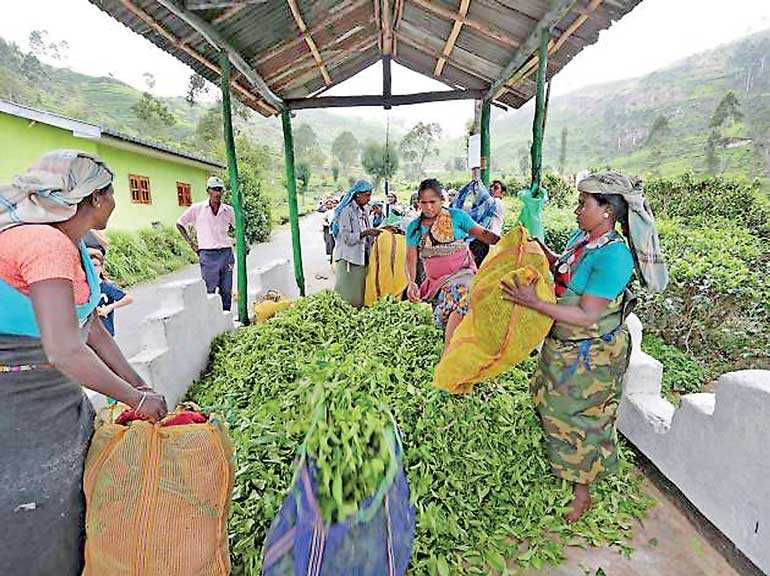Tuesday Feb 17, 2026
Tuesday Feb 17, 2026
Tuesday, 4 December 2018 00:00 - - {{hitsCtrl.values.hits}}


Estate workers on Regional Plantation Companies (RPC) managed estates have earned as much as Rs. 89,000 in the last month alone by working on tea fields that have been allocated to them on a revenue-share scheme. Top 20 pluckers from a hill country estate had earned on average Rs. 65,000 to 80,000 for the month of October alone.
In the recent past, due to shortage of workers, RPCs have sought the services of retired employees and allocated blocks of tea fields for tending and plucking. This has seen a surge in livelihood generation where the pluckers, not bound by norms and pay-roll obligation, have earned two to three times their daily wage. RPC’s therefore have been advocating this very model for estate workers as the most plausible solution for both the worker and the RPC – a model whereby the worker gets to manage and take charge of an area allocated to them.
This scheme allows a worker to pluck as much as she or he can with no limits or norms for daily plucking, resulting in pluckers bring in as much as 40 – 50 kg per day and collectively as a family have accounted for over 150 kg per day. RPC’s are confident that this revenue-share model in addition to the daily wages system is a progressive step and one that will benefit both the worker and the grower.
Deliberated for some time now and included in the 2016 Collective Agreement, signed by Trade Union leaders and the Employer’s Federation of Ceylon (EFC), the applicable clause states “The Unions undertake to support the improvement of productivity of the industry and at estate level by moving to productivity - linked based wage regime based on revenue share/out-grower models, etc. through the next agreement. In pursuance of this objective, parties agree to meet and discuss the modalities of implementing the above during the course of this agreement.” RPC’s re-iterate that the old archaic wage model must be replaced by the more progressive revenue-share one that allows a worker unlimited potential to earn.
This year, RPCs have put forward their recommendation of paying out Rs. 46 for every kilogram of tea plucked, which will warrant a daily wage of at least Rs. 1,012 for 22 kg of plucked tea leaves. “We hope leaders of the trade unions will appreciate this step in elevating the livelihood of workers from daily paid to being in charge of how much they earn at their pace,” stated the spokesperson for the Planters’ Association.
Tracing the rationale behind the revenue-share model the Planters’ Association explained that currently estates operate on a 50% depleted workforce. In 1992 there were 327,000 workers which have now dwindled to 160,000. “Only 16% of all residents on estates are workers. The rest are dependents,” he noted. Inadequacy of labour and the work ethic centred towards achieving the norm and no more meant that harvesting was delayed. It was these extended fields that were resuscitated and given to workers on the premise that they tend and nurture the fields and the crop yield is theirs to sell back to the Company. This arrangement has been on-going and one that has benefitted both the harvester and RPC although not termed before as ‘revenue-share’.
On this plan, a worker is offered 25 full working days plus the opportunity of working on the revenue sharing land which they do eagerly as if it were their own. Under their management the fields have flourished with RPC’s paying an enhanced rate for the crop harvested by them from these areas. “No worker can be forced to be a part of the revenue-share model, but we find enthusiasm with pensioners also plucking and tending these lands,” explained the PA.
“The Rs. 80,000 earned is incremental earnings and not through the daily wages system,” PA emphasised to reiterate that it is not through the daily wages system, but additional to it.
The revenue-share scheme is being piloted across several estates and workers themselves maintain that the model helps overcome inordinate shortage of labour while enabling them unlimited enhancement of income and livelihood. The new proposal enables high labour costs to be mitigated by improving worker productivity through performance-related pay – similar to the smallholder model – while enabling workers also to earn well beyond their present income.
“In the new model, remuneration depends on the worker’s output as opposed to the archaic attendance-based wage used at present, which provides little incentive to increase productivity and the new model thus also gives workers greater control over their earnings.”
Sri Lanka’s 400,000 tea smallholders, who produce nearly 75% of the nation’s total amount of green leaf function on a similar basis and have more than doubled the extent of their cultivations between 1992 and 2017, reflecting the viability, the success and the attractiveness of this model for all the parties involved and in the process have bettered their quality of life as well.